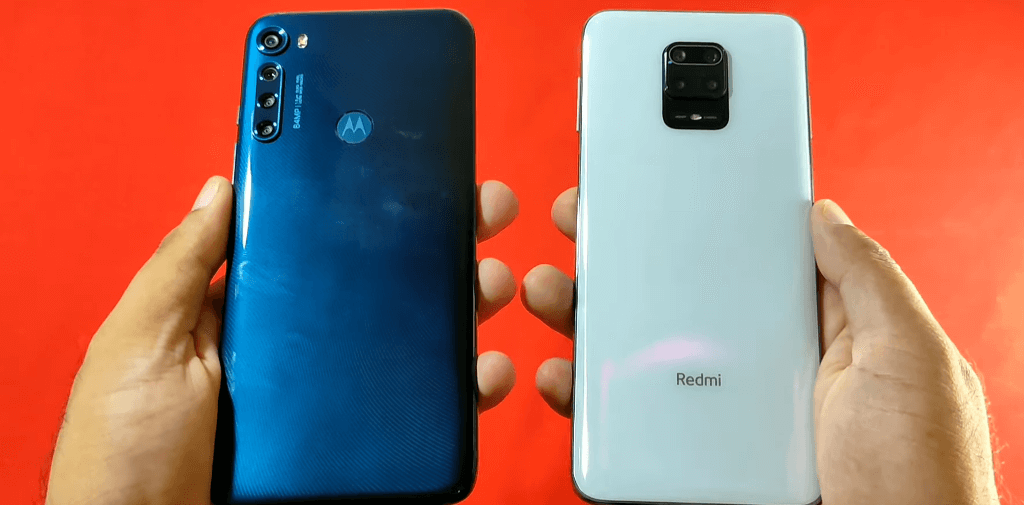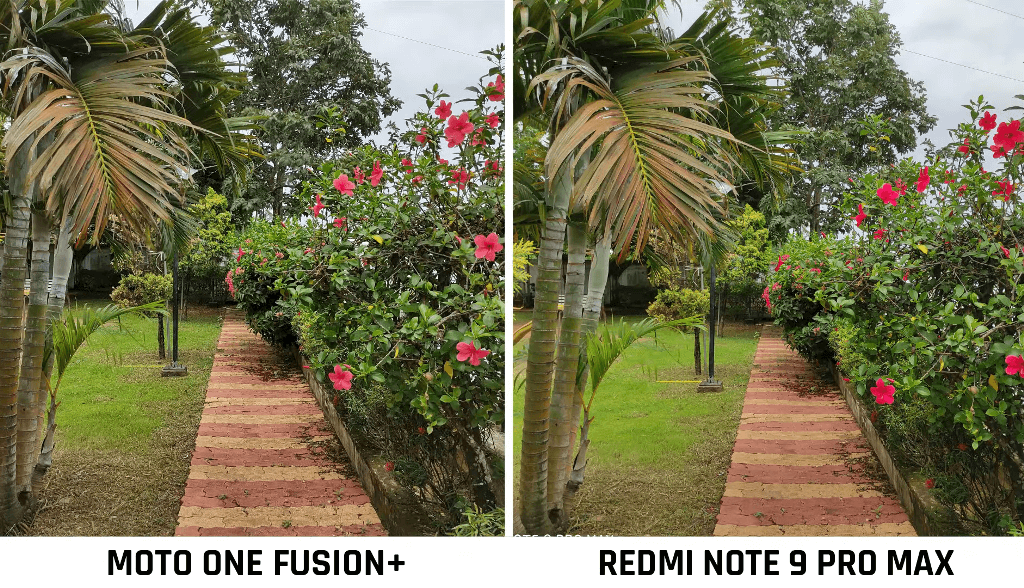The Moto One Fusion Plus with the Redmi Note 9 Pro Max both these devices have Android 10. In terms of the UI, we have the stock like UI on the Moto One Fusion Plus while we have the MUI 11 on the Redmi Note 9 Pro Max. Come let’s check out the detailed comparison between two devices and let us know which one is good for you.





Key Specification
| Motorola One Fusion Plus | Xiaomi Redmi Note 9 Pro Max | |
| Chipset | Qualcomm® Snapdragon™ 730 Octa-core Kryo 470 | Qualcomm SM7125 Snapdragon Octa-core |
| Display | 6.5 inches | 6.67 inches |
| Memory | 6 GB | 6 GB |
| Camera | 64+8+5+2 MP | 64+8+5+2 MP |
| Side Fingerprint Sensor | Rear | Yes |
Design
| Motorola One Fusion Plus | Xiaomi Redmi Note 9 Pro Max | |
| Dimensions | 162.9 x 76.4 x 9.6 mm | 165.5 x 76.7 x 8.8 mm |
| Weight | 210 grams | 209 grams |
| Screen Size | 6.5 inches | 6.67 inches |
| Color | Moonlight White, Twilight Blue | Aurora Blue, Glacier White, Interstellar Black |
| Display Type | IPS LCD | IPS LCD |
| Build Material | Glass front, plastic back, plastic frame | Glass front (Gorilla Glass 5), glass back (Gorilla Glass 5), plastic frame |


Performance
| Motorola One Fusion Plus | Xiaomi Redmi Note 9 Pro Max | |
| Processor | Qualcomm Snapdragon 730G | Qualcomm Snapdragon 720G |
| GPU | Adreno 618 | Adreno A618 @750MHz GPU |
| RAM | 6 GB | 6 GB |
| Internal storage | 128 GB | 128 GB |
| Storage expansion | Yes Up to 1 TB | Yes Up to 512 GB |
| OS | Android 10 | MIUI 11 |
Camera
| Motorola One Fusion Plus | Xiaomi Redmi Note 9 Pro Max | |
| Rear | 64MP (f/1.8, 0.8um) | 16MP (f/1.8, 1.6um) Quad Pixel | PDAF 8MP (f/2.2, 1.12um) | 118° ultra-wide angle 5MP (f/2.4, 1.12um) | Macro Vision camera 2MP (f/2.4, 1.75um) | depth sensor Single LED flash | 64 MP, f/1.9, 26mm (wide), 1/1.72″, 0.8µm, PDAF 8 MP, f/2.2, 13mm (ultrawide), 1/4.0″, 1.12µm 5 MP, f/2.4, (macro) 2 MP, f/2.4, (depth) |
| Front | 16 MP | 32 MP, (wide), 1/2.8″, 0.8µm |
| Video recording | 4K@30fps, 1080p@30/60fps | 4K@30fps, 1080p@30/60/120fps, 720p@960fps, gyro-EIS |
Motorola One Fusion Plus


Xiaomi Redmi Note 9 Pro Max


Multimedia
| Motorola One Fusion Plus | Xiaomi Redmi Note 9 Pro Max | |
| Headphone jack | 3.5 mm | 3.5 mm |
| Loudspeaker | Yes | Yes |
| Audio Features | – | – |
Battery Life
| Motorola One Fusion Plus | Xiaomi Redmi Note 9 Pro Max | |
| Capacity | 5000 mAh | 5020 mAh |
| Type | Li-ion | Li-ion |
| Quick Charging | Fast charging 15W | Yes 33W, 50% in 30 min |


Connectivity
| Motorola One Fusion Plus | Xiaomi Redmi Note 9 Pro Max | |
| SIM | Dual SIM, (1 Nano Sim+ 1 MicroSD) | Dual SIM, with Hybrid SIM |
| Bluetooth | Yes v5.0 | Yes v5.0 |
| Wifi | Yes Wi-Fi 802.11 a/b/g/n/ac | Yes Wi-Fi 802.11 a/b/g/n/ac |
| Sensors | accelerometer, gyro, proximity | Proximity sensor, Accelerometer, Ambient light sensor |
Which is better!
Motorola One Fusion Plus
- Motorola One Fusion Plus supports additional features like FM radio, Splash resistant, 3.5mm jack.
- All the buttons are on the right side of the device, and the Motorola One Fusion+ has a dedicated Google Assistant button placed higher than the power and volume buttons.
- Motorola One Fusion Plus phone is also suitable for heavy games that come with Huge battery life.
- It is a heavy phone and the popup camera isn’t fast and isn’t much durable could get damaged over time.
- There is no water or dust resistance on this phone.
Xiaomi Redmi Note 9 Pro Max
- Xiaomi Redmi Note 9 Pro Max comes with corning Gorilla Glass 5 on both sides.
- Note 9 Pro Max comes with a DRM L1 certificate to stream HD content from services like Netflix.
- The sim card slot includes 2 SIM cards and 1 SD card option.
- The Xiaomi Redmi Note 9 Pro Max comes with 33W Fast Charging.
- There is no AMOLED display support.





